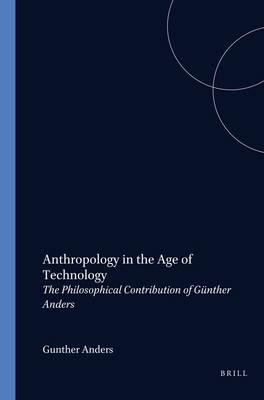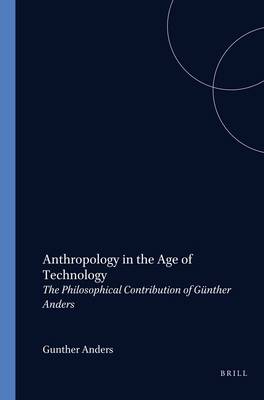
- Retrait gratuit dans votre magasin Club
- 7.000.000 titres dans notre catalogue
- Payer en toute sécurité
- Toujours un magasin près de chez vous
- Retrait gratuit dans votre magasin Club
- 7.000.0000 titres dans notre catalogue
- Payer en toute sécurité
- Toujours un magasin près de chez vous
Anthropology in the Age of Technology
The Philosophical Contribution of Günther Anders
Paul Van Dijk
102,45 €
+ 204 points
Description
This book is the first to discuss, for an English-speaking audience, the ideas of the German-Jewish man of letters, thinker, and activist Günther Anders. Anders is one of few philosophers to deal intensely with the moral consequences of Auschwitz and Hiroshima. He can rightly be called the philosopher of the atomic age, and his thinking a philosophy of modern technology.
In biting manifestoes, sharp aphorisms, and penetrating essays, in stirring diary notes and political fables, Anders strikes out the age in which we live. As a twentieth-century visionary, he exposes the absence of the moral and social imaginations that is necessary to prevent our history from ending in a total catastrophe. In the gap between our technical creations and our utter inability to imagine their destructive potential lies the basis for the unstoppable activity of this practical philosopher. From every possible angle, he attempts to comprehend this modern schizophrenia in its roots and consequences.
Anders is one of the most important thinkers of the twentieth century. He tried to describe and analyze the variety of manifestations of the "self-destructive progress of our technical civilization," which makes humanity into an "anti-quated" sort. He diagnosed countless important problems, ranging from the world of media to the dictates of the world of machinery, and he investigated their social, political, and philosophical meaning.
To read his writings is more than becoming acquainted with a rich and colorful philosopher. It is more than an encounter with a moving and passionate individual. It is ultimately a confrontation with oneself, with our own guilt and responsibility, with our personal hopes and fears, with our lack of imagination and with our need to recover it.
In biting manifestoes, sharp aphorisms, and penetrating essays, in stirring diary notes and political fables, Anders strikes out the age in which we live. As a twentieth-century visionary, he exposes the absence of the moral and social imaginations that is necessary to prevent our history from ending in a total catastrophe. In the gap between our technical creations and our utter inability to imagine their destructive potential lies the basis for the unstoppable activity of this practical philosopher. From every possible angle, he attempts to comprehend this modern schizophrenia in its roots and consequences.
Anders is one of the most important thinkers of the twentieth century. He tried to describe and analyze the variety of manifestations of the "self-destructive progress of our technical civilization," which makes humanity into an "anti-quated" sort. He diagnosed countless important problems, ranging from the world of media to the dictates of the world of machinery, and he investigated their social, political, and philosophical meaning.
To read his writings is more than becoming acquainted with a rich and colorful philosopher. It is more than an encounter with a moving and passionate individual. It is ultimately a confrontation with oneself, with our own guilt and responsibility, with our personal hopes and fears, with our lack of imagination and with our need to recover it.
Spécifications
Parties prenantes
- Auteur(s) :
- Editeur:
Contenu
- Nombre de pages :
- 208
- Langue:
- Anglais
- Collection :
- Tome:
- n° 103
Caractéristiques
- EAN:
- 9789042014022
- Date de parution :
- 01-01-00
- Format:
- Livre broché
- Format numérique:
- Trade paperback (VS)
- Dimensions :
- 155 mm x 235 mm
- Poids :
- 376 g

Les avis
Nous publions uniquement les avis qui respectent les conditions requises. Consultez nos conditions pour les avis.






